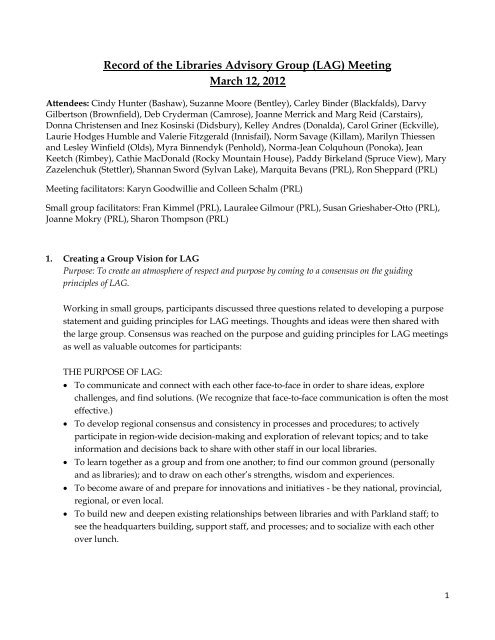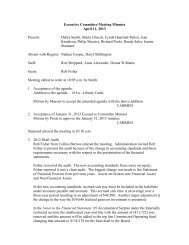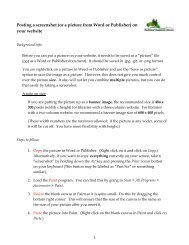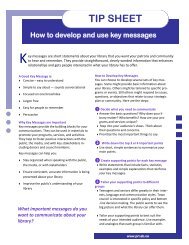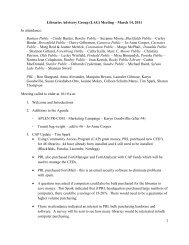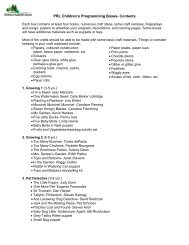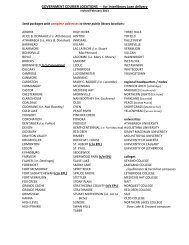Record of Meeting - Parkland Regional Library
Record of Meeting - Parkland Regional Library
Record of Meeting - Parkland Regional Library
Create successful ePaper yourself
Turn your PDF publications into a flip-book with our unique Google optimized e-Paper software.
<strong>Record</strong> <strong>of</strong> the Libraries Advisory Group (LAG) <strong>Meeting</strong><br />
March 12, 2012<br />
Attendees: Cindy Hunter (Bashaw), Suzanne Moore (Bentley), Carley Binder (Blackfalds), Darvy<br />
Gilbertson (Brownfield), Deb Cryderman (Camrose), Joanne Merrick and Marg Reid (Carstairs),<br />
Donna Christensen and Inez Kosinski (Didsbury), Kelley Andres (Donalda), Carol Griner (Eckville),<br />
Laurie Hodges Humble and Valerie Fitzgerald (Innisfail), Norm Savage (Killam), Marilyn Thiessen<br />
and Lesley Winfield (Olds), Myra Binnendyk (Penhold), Norma-Jean Colquhoun (Ponoka), Jean<br />
Keetch (Rimbey), Cathie MacDonald (Rocky Mountain House), Paddy Birkeland (Spruce View), Mary<br />
Zazelenchuk (Stettler), Shannan Sword (Sylvan Lake), Marquita Bevans (PRL), Ron Sheppard (PRL)<br />
<strong>Meeting</strong> facilitators: Karyn Goodwillie and Colleen Schalm (PRL)<br />
Small group facilitators: Fran Kimmel (PRL), Lauralee Gilmour (PRL), Susan Grieshaber-Otto (PRL),<br />
Joanne Mokry (PRL), Sharon Thompson (PRL)<br />
1. Creating a Group Vision for LAG<br />
Purpose: To create an atmosphere <strong>of</strong> respect and purpose by coming to a consensus on the guiding<br />
principles <strong>of</strong> LAG.<br />
Working in small groups, participants discussed three questions related to developing a purpose<br />
statement and guiding principles for LAG meetings. Thoughts and ideas were then shared with<br />
the large group. Consensus was reached on the purpose and guiding principles for LAG meetings<br />
as well as valuable outcomes for participants:<br />
THE PURPOSE OF LAG:<br />
To communicate and connect with each other face-to-face in order to share ideas, explore<br />
challenges, and find solutions. (We recognize that face-to-face communication is <strong>of</strong>ten the most<br />
effective.)<br />
To develop regional consensus and consistency in processes and procedures; to actively<br />
participate in region-wide decision-making and exploration <strong>of</strong> relevant topics; and to take<br />
information and decisions back to share with other staff in our local libraries.<br />
To learn together as a group and from one another; to find our common ground (personally<br />
and as libraries); and to draw on each other’s strengths, wisdom and experiences.<br />
To become aware <strong>of</strong> and prepare for innovations and initiatives - be they national, provincial,<br />
regional, or even local.<br />
To build new and deepen existing relationships between libraries and with <strong>Parkland</strong> staff; to<br />
see the headquarters building, support staff, and processes; and to socialize with each other<br />
over lunch.<br />
1
LAG GUIDING PRINCIPLES - FORMAT:<br />
Include a mix <strong>of</strong> small, diverse group work and large group discussions, as well as case studies<br />
as appropriate; keep the informative aspect, and break the day up into smaller portions.<br />
Include as many libraries as possible through the use <strong>of</strong> technology (e.g. YouTube clips,<br />
Twitter [#prllag], videoconference or webcasts) and by attracting staff from libraries who<br />
haven’t traditionally attended.<br />
Send out agenda and information package in advance so participants have time to think about<br />
things before the meeting. The expectation is that attendees will come prepared to contribute<br />
to discussions and participate in decisions. Those unable to attend have the opportunity to<br />
express thoughts and opinions to <strong>Parkland</strong> librarians prior to the meeting.<br />
Have realistic time allotments for topics/activities and don’t overload people with<br />
information.<br />
Increase the number <strong>of</strong> meetings if necessary to avoid information overload and to allow for<br />
topics to be fully explored and decisions made.<br />
LAG GUIDING PRINCIPLES - PROCESS:<br />
Come with an open mind; be respectful <strong>of</strong> all opinions and points <strong>of</strong> view; be willing to<br />
contribute even when it takes me beyond my comfort zone.<br />
Bridge the gap between larger and smaller libraries by recognizing their different needs, by<br />
keeping in mind what is best for ALL libraries (not just my library), and by sharing and<br />
celebrating individual libraries’ successes and failures (innovative libraries take risks and what<br />
didn’t work for you might work for someone else).<br />
Observe civility and best behaviour in both small and large group discussions, including:<br />
o Listen actively and attentively<br />
o Discuss and participate enthusiastically<br />
o Ask questions when you don’t understand<br />
o Allow and encourage others to contribute (we need the wisdom <strong>of</strong> all for the wisest results)<br />
o Confine the discussion to the topic at hand<br />
Honour the commitment <strong>of</strong> those who attend (decisions are made at LAG meetings on behalf<br />
<strong>of</strong> all libraries and can be implemented without further consultation)<br />
<br />
“What would consultants do” The openness and support we get from our consultants is a<br />
good model for the type <strong>of</strong> environment we want to create at LAG meetings.<br />
VALUABLE OUTCOMES FOR PARTICIPANTS OF LAG<br />
Having the opportunity to change my mind<br />
Gaining a clearer understanding <strong>of</strong> what is happening and why (including the need for and<br />
rationale behind system-wide standards and processes)<br />
Knowing the reason for decisions, helping to make decisions, and experiencing a sense <strong>of</strong><br />
accomplishment from making decisions<br />
2
2. Info Spree<br />
Purpose: To share information from <strong>Parkland</strong> in an efficient and useful format.<br />
Background information was sent out with the LAG agenda a few weeks before the meeting.<br />
Topics in the Info Spree included: reports on the status <strong>of</strong> action items from the November 7 th<br />
LAG meeting, <strong>Parkland</strong>’s fall satisfaction survey results, and the fall large print survey results;<br />
IT update; cataloguing practices for eReaders with and without titles; subsidies available to<br />
attend the Alberta <strong>Library</strong> Conference; new charges for plastic membership card sleeves and<br />
geocaching as a library program.<br />
These topics were reviewed and discussed in small groups. Following the small group<br />
discussions, two items were brought forward to the large group:<br />
Clarification on the Alberta <strong>Library</strong> Conference subsidies: the deadlines for the LAA and<br />
ALTA subsidies are May 31 st . Delegates attend the conference in April and submit their<br />
subsidy application by the deadline for that year’s conference.<br />
Discussion and decision about cataloguing (and lending) eReaders:<br />
o Is loading Kobo books onto more than one device against the terms <strong>of</strong> service<br />
Kindle specifically states that books can be loaded on up to 6 devices; Kobo does not<br />
prohibit multiple downloads, does not address library use, and does not specify the number<br />
<strong>of</strong> legal downloads.<br />
o Local only vs. region-wide lending <strong>of</strong> devices. Are there settings in Horizon so that only local<br />
patrons can request/borrow eReaders Or can Horizon be configured so patrons must physically<br />
pick-up and return devices at the owning library<br />
Although it is possible to make patrons pick up an item at the owning library, there is really<br />
no way to physically prevent them from returning a device to another library. One option is<br />
to institute a fine for devices not returned to the home library (e.g. $10 fee if not returned to<br />
the home library service desk).<br />
Decision: Marquita will set up Horizon so that devices must be checked out at the owning<br />
library. <strong>Parkland</strong> will also investigate the possibility <strong>of</strong> making eReaders requestable only<br />
by local patrons for those libraries who wish such a restriction.<br />
NEW: charges for plastic membership card covers:<br />
The Alberta <strong>Library</strong> (TAL) is now charging for these sleeves so <strong>Parkland</strong> can no longer distribute<br />
them to libraries without charge. There will be a minimum order <strong>of</strong> 50 sleeves and all orders<br />
must be in multiples <strong>of</strong> 50. The cost is $10.75 per bundle <strong>of</strong> 50. Sample pricing:<br />
50 sleeves $10.75 250 sleeves $53.75<br />
100 sleeves $21.50 500 sleeves $107.50<br />
3
3. Discussion Topic: Lending procedures for patrons with fines<br />
Purpose: To reach a consensus on procedures for sending items to patrons with outstanding fines <strong>of</strong> $10<br />
or more.<br />
In a large group discussion, every library had the opportunity to voice an opinion. Some<br />
expressed concern about “protecting” library material from problem patrons. Others talked<br />
about the power <strong>of</strong> an item sitting “right there on the holds shelf” as an enticement for patrons<br />
to pay down their library fines. It was noted that there is never a guarantee <strong>of</strong> getting library<br />
materials back from any patron. Also, each library has the right to develop relationships with<br />
their own patrons and to determine whether patrons are in good standing. <strong>Regional</strong>ly,<br />
Horizon has been configured to flag any patron with more than $10 in outstanding fines.<br />
(Local policies may be more restrictive.) Participants agreed that we need to trust each other<br />
not to lend any library’s materials to patrons unless they are in good standing. It was also<br />
acknowledged that staff in all libraries need to be, and are, cognizant <strong>of</strong> treating all shared<br />
material with the same respect we give to the items we own ourselves.<br />
Decision: Owning library will send the requested item to the patron’s library. Staff at the<br />
patron’s home library will check out the item if/when the patron is in good standing. For ship<br />
to patron items, the owning library will contact the patron’s library before shipping if there are<br />
outstanding fines <strong>of</strong> over $10.<br />
4. Discussion Topic: Working with library boards<br />
Purpose: To share information about library managers working together with their boards, specifically<br />
success stories and strategies for managing difficult situations.<br />
The topic was discussed in small groups with a large group “round up” at the end to share<br />
discussion results. Ideas generated include:<br />
Board members need training in order to be effective. Sources <strong>of</strong> training include Alberta<br />
<strong>Library</strong> Trustees Association (including resources and links on their website), Board<br />
Development Program within Alberta Culture and Community Spirit, and <strong>Parkland</strong><br />
<strong>Regional</strong> <strong>Library</strong> (including information and links on the website).<br />
A board orientation procedure is a good way to inform new board members <strong>of</strong> board versus<br />
library manager’s roles. <strong>Library</strong> managers see value in participating in the orientation<br />
process for new members. One library also gives each new board member a flash drive<br />
containing all important documents (e.g. bylaws and policies, plan <strong>of</strong> service, minutes from<br />
past three meetings, Libraries Act and Libraries Regulation, links to ALTA, etc.)<br />
Board members must understand that they are accountable for their responsibilities and<br />
that they can be held accountable for what they do and do not do.<br />
A board member who misses three consecutive meetings is deemed to have resigned under<br />
the Libraries Act. When this happens, the board chair informs the municipal council and<br />
4
sends a letter to the resignee. To avoid being recorded as missing from a meeting, there<br />
must be a motion to accept the reason for that board member’s absence in the previous<br />
meeting minutes. (i.e. Board members must indicate why they cannot attend the next<br />
meeting and the board accepts the pending absence and records it in the minutes)<br />
Effective board recruitment includes having current board members and library staff<br />
approach people they believe would be effective trustees and by “talking up the library” to<br />
such people.<br />
Additional notes from the small group discussion on working with library boards are in<br />
Appendix I.<br />
5. Consideration <strong>of</strong> a region-wide membership drive<br />
Purpose: To examine the possibility <strong>of</strong> a region-wide membership drive in fall 2012.<br />
Ron presented the rationale for a region-wide membership drive (low library membership<br />
rates – less than 20% - throughout the system) and asked for feedback from the whole group<br />
on whether they felt their boards would support such an endeavour. All participants felt that<br />
their boards would support the idea in principle and they liked the idea <strong>of</strong> working together to<br />
help increase local library membership numbers. Concerns were raised about finding the<br />
balance between attracting new members versus the loss <strong>of</strong> income. Points included:<br />
<br />
<br />
<br />
<br />
Free new memberships may alienate existing members.<br />
Free memberships and renewals may cause some existing members to renew early so<br />
as not to be charged.<br />
Free or reduced card fees will affect the projected budget for this year.<br />
Free cards might create possible conflicts with plans at member libraries for similar<br />
ventures in 2012 or early 2013.<br />
One solution identified was to <strong>of</strong>fer “three months for free” trial membership to get people in<br />
the door and hooked.<br />
Decision: LAG attendees would like <strong>Parkland</strong> to further pursue options for some type <strong>of</strong><br />
region-wide membership drive.<br />
5
6. Evaluating the process<br />
Purpose: To determine if today’s facilitated meeting format is suitable for LAG and what future<br />
adjustments are necessary.<br />
Each small group spent a few minutes discussing the new format <strong>of</strong> the LAG meetings and<br />
provided written feedback on whether they felt the process was effective as well as<br />
suggestions for future meetings.<br />
Evaluations indicated that participants were happy with the changes to LAG and felt it was an<br />
effective experience. Overall, the use <strong>of</strong> small group discussion was seen as a positive way to<br />
have a more interactive and personal discussion in which all members were willing and<br />
comfortable to share their ideas. It was good to have a <strong>Parkland</strong> representative at each group<br />
to help facilitate discussion and ensure ideas were captured and not lost in the heat <strong>of</strong><br />
discussion. It was also beneficial to have individual groups report back their ideas to the<br />
larger group. One group reported that they felt the revision <strong>of</strong> LAG demonstrated that<br />
<strong>Parkland</strong> is listening and responding to its constituents.<br />
Participants appreciated the mixture <strong>of</strong> small group discussion for some topics and large<br />
group discussion for others and felt comfortable being pre-assigned to a small group in order<br />
to provide diversity <strong>of</strong> experience, geography, and community sizes. This format also helped<br />
break up the day and set an atmosphere in which people could comfortably get refreshments<br />
or take a health break at their leisure.<br />
While the morning activities <strong>of</strong> creating a vision for LAG were recognized as necessary and<br />
useful to provide clarity and set the tone for future meetings, participants are looking forward<br />
to reassigning this time for discussion <strong>of</strong> topics. In particular, groups would have appreciated<br />
more time to discuss the Info Spree portion <strong>of</strong> the agenda. One suggestion was that future<br />
meetings might include small group work in the morning and large group work in the<br />
afternoon.<br />
<strong>Meeting</strong> attendees appreciated receiving background information in advance as it saves time<br />
at the meeting and creates a more informed discussion because participants are able to read<br />
and think about the topics prior to the meeting. Being invited to submit topics for discussion<br />
ahead <strong>of</strong> time is appreciated as well.<br />
The biggest challenges reported were related to the difficulty <strong>of</strong> hearing all participants speak,<br />
especially for those with s<strong>of</strong>ter voices. The room set-up for small group discussions meant that<br />
not all participants were facing each other, so that also made some <strong>of</strong> the large group<br />
discussion more difficult.<br />
The full comments from the evaluation process are recorded in Appendix II.<br />
6
APPENDIX I<br />
WORKING WITH LIBRARY BOARDS: NOTES FROM SMALL GROUPS<br />
<br />
<br />
<br />
<br />
Have an orientation process in place for new board members/trustees (library board member<br />
and library trustee are synonymous)<br />
o Every new board member should get a board package with all the documents they<br />
need (in a binder or on flash drive) such as plan <strong>of</strong> service, roles/responsibilities,<br />
bylaws & procedures, Libraries Act & Regulation, etc.<br />
o <strong>Library</strong> manager does the orientation (for consistency)<br />
Board members (both new and existing) need training in order to be effective trustees<br />
o Encourage trustees to attend ALTA workshops, Alberta <strong>Library</strong> Conference<br />
o Trustee orientation with Ron is helpful<br />
o Alberta Culture and Community Spirit has a free board development program for<br />
trustees (they come to you) - they review your bylaws, policies, etc. and then tailor the<br />
workshop to what you need<br />
o The orientation must clearly inform trustees what their roles and responsibilities are;<br />
that their role as a trustee must be taken seriously; and that the library board is an<br />
employer<br />
o Board needs to take responsibility for their roles and not <strong>of</strong>fload to library manager -<br />
board needs to be accountable for their responsibilities<br />
o Provide facts and figures about the library to help trustees become advocates<br />
Recruiting new members<br />
o Talk to existing board members (clarify expectations)<br />
o Advertise in the library or local community newsletter or in the local paper<br />
o Get board members to actively look for new members<br />
o The board increases in number when considering building a new library<br />
Micromanaging<br />
o Establish clear roles (part <strong>of</strong> orientation)<br />
o Clarify roles/responsibilities <strong>of</strong> board vs. staff - board should concentrate on big<br />
picture, don’t waste time on things that are not their responsibility to deal with<br />
o Micromanaging is not good. Get another board member to mention it<br />
o Show the board you are trustworthy and you will be trusted<br />
o Sometimes the board needs to share/suggest how to deal with specific situations.<br />
o Another issue can be staff going to library board rather than manager (also not<br />
understanding the roles <strong>of</strong> each)<br />
7
Board meeting agenda – who makes it<br />
o Setting the agenda is the responsibility <strong>of</strong> the Chair (whether Board or committee), with input<br />
from other trustees, committee members, and senior staff. Responsibility for the agenda should<br />
not be abdicated to the Board Secretary or senior staff, though they may provide assistance.<br />
(The Handbook, Alberta <strong>Library</strong> Trustees Association, 2009, p. 21)<br />
Want/need to know more about the budget process – setting and working with the budget<br />
throughout the year<br />
Successes and challenges in working with boards:<br />
o Board members don’t commit; will only attend meetings but do nothing else<br />
o Trustees who don’t regularly attend meetings but don’t miss 3 consecutive meetings<br />
o Overworked board – used to fill in as volunteers, no longer can<br />
o Volunteer burnout – major issue in small towns<br />
o Trustees should withdraw from the board if they aren’t able to do some work for it<br />
o Difficult to get them doing what they should when trustees don’t have too much<br />
interest in the library<br />
o Will let me run the library<br />
o Board really helps and works as a team. Very helpful<br />
o Board composition changes over time – eventually negative members may leave<br />
8
APPENDIX II<br />
EVALUTING THE PROCESS: NOTES FROM SMALL GROUPS<br />
1. Pre-meeting information package (timeliness and relevancy)<br />
Excellent, good, or loved it - reported by all groups<br />
Gave managers a chance to talk to staff about topics before the meeting<br />
Saves time for everybody and creates more informed discussion<br />
Not too early to get lost, but early enough to have time to read it<br />
Yes, information was relevant<br />
2. Group vision process<br />
Unnecessary to go through it twice (small and then large group) - too long <strong>of</strong> a review<br />
Review <strong>of</strong> input brought clarity; good clarification and good to set tone<br />
Shorten process: bit long, got <strong>of</strong>f topic, didn’t need to go over it again<br />
Process in general was good; necessary, but not needed in the future<br />
3. Topics <strong>of</strong> discussion<br />
Relevant, good (reported by all groups)<br />
Good to split topics into some small group and some large group discussions<br />
Ability to submit topics ahead <strong>of</strong> time is a plus (reported by 2 groups)<br />
4. Clear purpose (discussion topics, meeting, etc.)<br />
Yes, good (reported by all groups)<br />
Less <strong>of</strong>f topic discussion; less negativity during discussion<br />
Format was explained very well<br />
Good to move along when needed<br />
5. Usefulness <strong>of</strong> discussion formats (small group discussions, etc.)<br />
<br />
<br />
<br />
<br />
<br />
<br />
<br />
<br />
<br />
Like small groups to allow personal discussion, but they take more time<br />
Small groups were better: more chance to participate; our group was exceptional! More<br />
interaction in small group and more people comfortable speaking up<br />
Like big discussion<br />
More half and half with small and big discussions; morning for small groups and large<br />
group in the afternoon<br />
Good to hear from other groups; points from each group written down so nothing is lost<br />
Excellent; really good format; built relationships with different people and ideas<br />
Not so many topics (e.g. Info Spree)<br />
Placement is good<br />
Provides opportunity to change my mind<br />
9
6. Facilitation process<br />
<br />
<br />
<br />
<br />
<br />
<br />
Good to have PRL person at the table (e.g. to take notes to allow ideas to flow)<br />
Never yawned, no foot-tapping; sat on the edge <strong>of</strong> my chair to listen (this is unusual for me<br />
at LAG meetings)<br />
Effective; wasn’t too dry, relaxed feeling<br />
Too much repetition <strong>of</strong> facilitation<br />
Good timekeeping in the second half <strong>of</strong> the day (use <strong>of</strong> alarm); good - kept us on track<br />
Felt rushed sometimes; would have liked more time to discuss things<br />
7. Do you feel that this new format will improve the value <strong>of</strong> LAG for you<br />
<br />
<br />
<br />
<br />
<br />
<br />
<br />
<br />
<br />
<br />
<br />
All groups reported they liked the format overall better than previous LAG format<br />
Good to have flexibility to switch back and forth between large and small groups<br />
Felt more comfortable to get up for a bio break; didn’t miss having an <strong>of</strong>ficial break<br />
Not sufficient time after small group discussions and the end <strong>of</strong> discussions to allow for<br />
digestion<br />
There was more open discussion at the end<br />
Liked that there was no picking on specific libraries but rather examination <strong>of</strong> processes<br />
Like consensus<br />
Can’t always see who’s talking; cannot see everyone’s faces<br />
Cannot hear s<strong>of</strong>t voices, especially when facing another direction; can never hear Ron, his<br />
voice is too s<strong>of</strong>t<br />
Seating facilitated equality <strong>of</strong> all participants<br />
Didn’t mind sitting in the same group for the entire day; felt comfortable with being preassigned<br />
to a small group<br />
8. Do you have other suggestions<br />
<br />
<br />
More time was needed to discuss topics in the Info Spree (reported by 2 groups)<br />
Mix groups up (even though our group was the best!); we need to share our gifts with<br />
others<br />
9. Additional comments:<br />
More chocolate<br />
Lunch was delicious<br />
Special thanks to Anna for the great lunch!<br />
Overkill on bathroom info<br />
Soup could have been warmer (or maybe bowl was too cold)<br />
PRL is listening to libraries and responding by doing this (also with website changes)<br />
10


